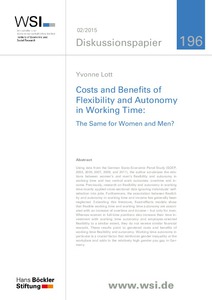Costs and benefits of flexibility and autonomy in working time. The same for women and men?

Hans-Böckler-Stiftung, Düsseldorf
HBS - Düsseldorf
2015
35 p.
flexible working time ; gender ; working time
WSI Discussionpaper
196
Working time and leave
English
Bibliogr.
"Using data from the German Socio-Economic Panel Study (SOEP, 2003, 2005, 2007, 2009, and 2011), the author scrutinizes the relations between women's and men's flexibility and autonomy in working time and two central work outcomes: overtime and income. Previously, research on flexibility and autonomy in working time mostly applied crosssectional data ignoring individuals' self-selection into jobs. Furthermore, the association between flexibility and autonomy in working time and income has generally been neglected. Extending this literature, fixedeffects models show that flexible working time and working time autonomy are associated with an increase of overtime and income - but only for men. Whereas women in fulltime positions also increase their time investment with working time autonomy and employeeoriented flexibility to a similar extent, they do not receive similar financial rewards. These results point to gendered costs and benefits of working time flexibility and autonomy. Working time autonomy in particular is a crucial factor that reinforces gender inequality at the workplace and adds to the relatively high gender pay gap in Germany."
Digital
The ETUI is co-funded by the European Union. Views and opinions expressed are however those of the author(s) only and do not necessarily reflect those of the European Union or the ETUI.